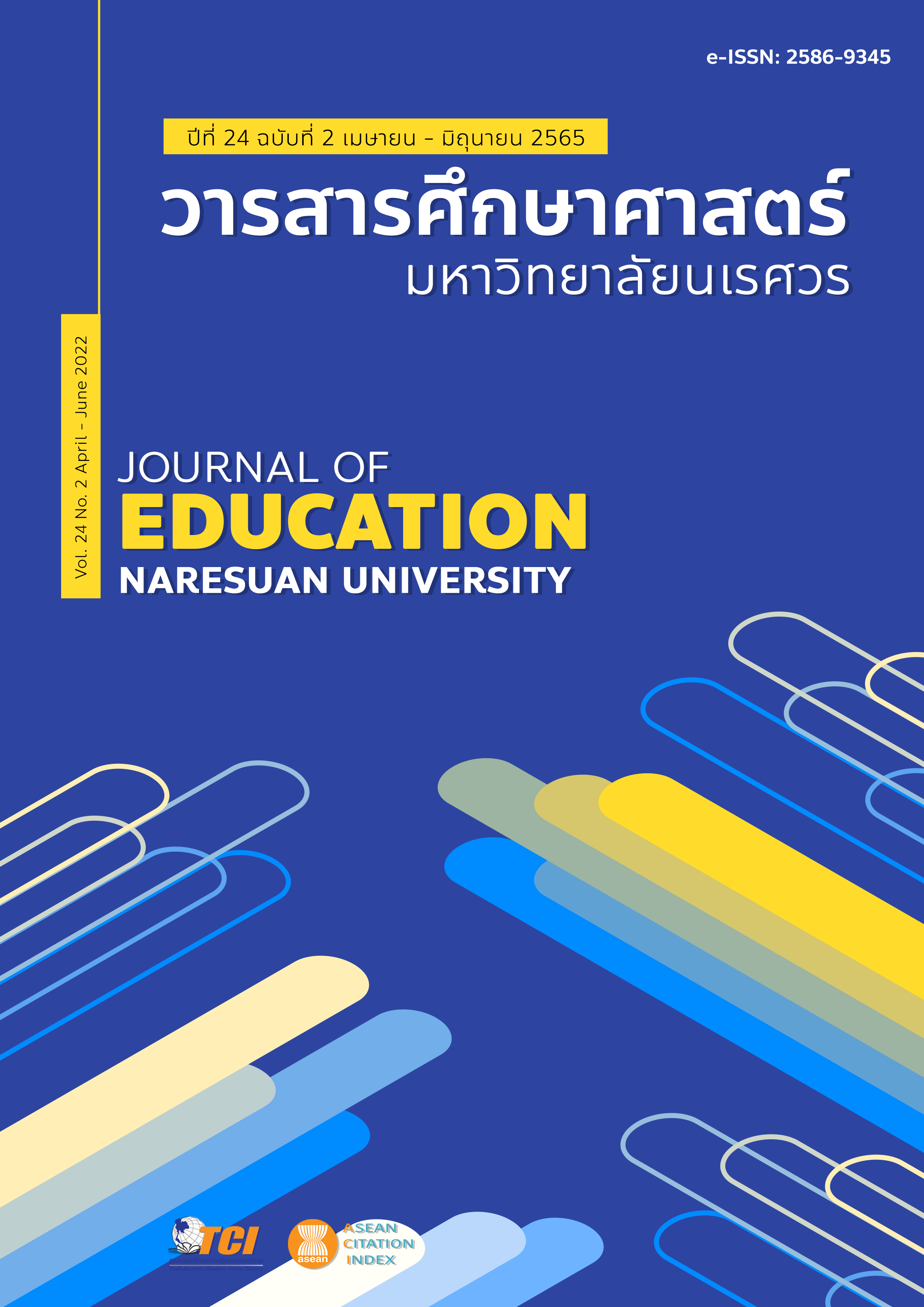THE DEVELOPMENT OF GROWTH MINDSET TEST FOR CODING TEACHERS การพัฒนาแบบวัด GROWTH MINDSET สำหรับครูผู้สอนวิทยาการคำนวณ
Main Article Content
Abstract
The Ministry of Education have announced a national policy that embedded a new subject ‘Coding' in the core curriculum of basic education. The presence of new subject adds challenges to teachers. One of the key success factors when facing new challenges is the ‘Growth mindset’, but with an abstract nature, making it difficult to measure. Therefore, this study aimed to (1) develop items of the ‘Growth Mindset Test for Coding Teacher’ that is consistent with the context of teachers assigned to teach this new subject, then testing of its validity, (2) extract components of the test and (3) analyze the reliability of the test. Data were collected in two phases by combining qualitative and quantitative methods. The first phase was collecting qualitative data through in-depth interviews with 9 experts (7 educational experts and 2 psychological experts). Content analysis was employed to analyze expert’s interview information to develop the test's items along with the analysis of IOC to test content validity. In the second phase, quantitative data was collected with 324 teachers who assigned to teach Coding. Data was analyzed using descriptive statistics, component extraction with EFA, and internal consistency with Cronbach’s Alpha. Result of the EFA identified a three-component structure of the Growth Mindset Test for Teachers with 37 items, together explained 61.757% of the total variance. The components included (1) Positive attitude from inside consisted of 21 items, together explained 52.570 % of the total component variance, (2) Believe in one's growth consisted of 10 items, together explained 5.539 % of the total component variance, and (3) Appreciating the value of cognitive growth consisted of 6 items, together explained 3.647 % of the total component variance. Regarding the quality of the test, it was found that the content validity of all items was > .60 and the reliability was .973 (very good level). Thus, this Growth Mindset Test for Teachers appears to possess adequate properties, resulting in an alternative tool that can be used in practice. The test is able to reflect the level of growth mindset in terms of its component score and total score.
Article Details

This work is licensed under a Creative Commons Attribution-NonCommercial-NoDerivatives 4.0 International License.
The owner of the article does not copy or violate any of its copyright. If any copyright infringement occurs or prosecution, in any case, the Editorial Board is not involved in all the rights to the owner of the article to be performed.
References
Blackwell, S., Trzesniewski, H., & Dweck, C. (2007). Implicit theories of intelligence predict achievement across an adolescent transition: A longitudinal study and an intervention. Child Development, 78(1), 246–263.
Dweck, C. S. (2006). Mindset: The new psychology of success: How we can learn to fulfill our potential. New York, NY: Ballantine.
Dweck, C. S., & Yeager, D. S. (2019). Mindsets: A view from two eras. Perspectives on Psychological Science, 14(3), 481–496.
Gutshall, C. A. (2013). Teachers’ mindsets for students with and without disabilities. Psychology in the Schools, 50(10), 1073-1083.
Hair, J. F., Black, W. C., Babin, B. J., & Anderson, R. E. (2014) Multivariate data analysis (7th ed.). Edinburgh Gate: Pearson Education.
Hochanadel, A., & Finamore, D. (2015). Fixed and growth mindset in education and how grit helps students persist in the face of adversity. Journal of International Education Research, 11(1), 47-50.
Mindset Works Educator Kit. (2012). Mindset assessment profile tool. Retrieved April 16, 2020 from https://achieve.lausd.net/cms/lib/CA01000043/Centricity/ Domain/173/MindsetAssessmentProfile.pdf
Rissanen, I., Kuusisto, E., Tuominen, M., & Tirri, K. (2018). In search of a growth mindset pedagogy. A case study of one teacher’s classroom practices in Finnish elementary school. Teaching and Teacher Education, 77, 204-213.
Ronkainen, R., Kuusisto, E., & Tirri, K. (2019). Growth mindset in teaching: A case study of a Finnish elementary school teacher. International Journal of Learning, Teaching and Educational Research, 18(8), 141-154
Schmidt, J. A., Shumow, L., & Kackar, C. H. (2105). Exploring teacher effects for mindset intervention outcomes in seventh-grade science classes. Middle Grades Research Journal, 10, 17-32.
Seaton, F. S. (2018). Empowering teachers to implement a growth mindset. Educational Psychology in Practice, 34:1, 41-57.
Sianglum, P. (2020). A study of problems and needs for the development of unplugged coding learning for coding teachers of pratomsuksa 5, Ban Wan Yai School using coaching techniques. Retrieved June 28, 2020, from https://www.mdh.go.th/news_file/p77056332118.pdf [in Thai]
Silpakit, C., Silpakit, O., & Chomchuen, R. (2015). The validity study of the mindset assessment scale. Journal of Mental Health of Thailand, 23(3), 166-174. [in Thai]
Sianglum, P. (2020). A study of problems and needs for the development of unplugged coding learning for coding teachers of pratomsuksa 5, Ban Wan Yai School using coaching techniques. Retrieved June 28, 2020 from https://www.mdh.go.th/news_file/p77056332118.pdf [in Thai]
Tabachnick, B. G., & Fidell, L. S. (2014). Using multivariate statistics (6th ed.). Edinburgh Gate: Pearson Education.
The Institute for the Promotion of Teaching Science and Technology. (2020). IPST responds to the policy of the Ministry of Education, pushing large-scale computational science and coding science throughout the country. Retrieved April 16, 2020 from http://www.ipst.ac.th/index.php/news-and-announcements/training-seminar/item/4358-2020-01-22-07-30-44 [in Thai]
Uluduz, H., & Gunbayi, L. (2018). Growth mindset in the classroom. European Journal of Education Studies, 4(9), 173-186.
Yong, A. G., & Pearce, S. (2013). Beginners guide to factor analysis: Focusing on exploratory factor analysis. Tutorials in Quantitative Methods for Psychology, 9(2), 79-94.
Zhang, J., Kuusisto, E., & Tirri, K. (2017). How teachers’ and students’ mindsets in learning have been studied: Research findings on mindset and academic achievement. Psychology, 8, 1363-1377.
Zilka, A., Grinshtain, Y., & Bogler, R. (2019). Fixed or growth: teacher perceptions of factors that shape mindset. Professional Development in Education, DOI:10.1080/19415257.2019.1689524


